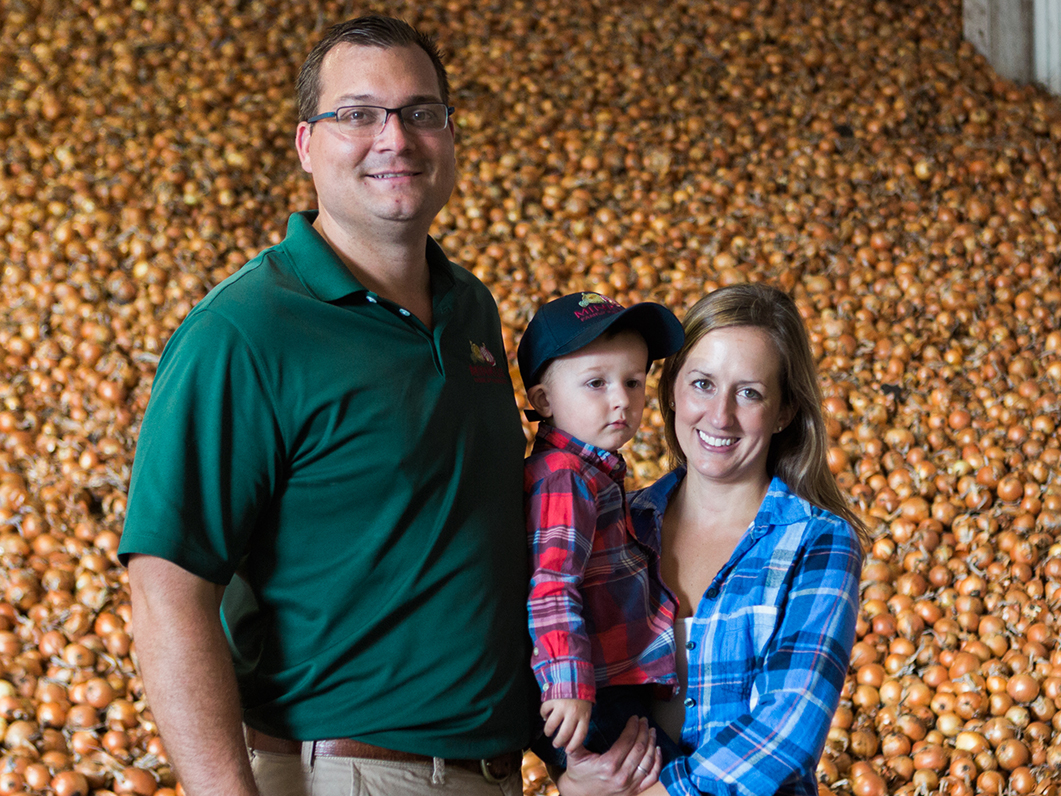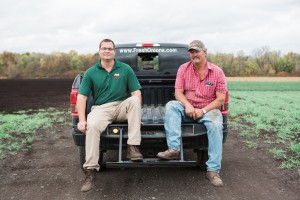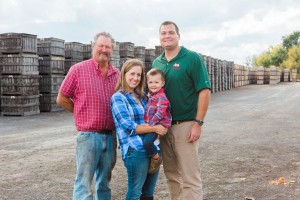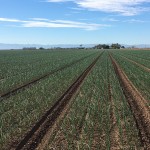As food safety officer and director of business development at Minkus Family Farms in Orange County, NY, 32-year-old Millennial Trailblazer Dylan Dembeck exhibits not only the characteristic enthusiasm of his generation but also a healthy dose of clear-sightedness from his elders. The result is a very focused and energetic approach to food safety and business development at the family-owned onion growing/shipping operation.
Dylan is quick to credit his father-in-law, Rick Minkus, with the foundation of the company.
“Rick is a first generation farmer,” Dylan said. “He started with 50 acres in 1993 and now farms about 1,500 acres, His two sons, Joe, 36, and Tom, 28, have joined him along with is wife, Geri. Geri is a CPA who left her accounting firm when the farm became a full-time job.”
His own introduction to the company came through his wife, Kim, who is Rick and Geri’s only daughter. Dylan and Kim have two children, five-year-old Livia and two-and-a-half-year-old Ethan.
However, his background with Orange County is lifelong.
“I am from the area,” he said. “I was born in Bergen County, NJ, and my family moved to Slate Hill, NY, when I was seven years old. Slate Hill is next town over from Minkus Family Farms, and we now live in Warwick, NY, which is 10 minutes from the farm.”
Dylan continued, “Kim and I went to same high school, Minisink Valley. She was a year older, but we knew some of the same people.” After high school, Dylan attended Mount Saint Mary College for finance. He and Kim “hung out with some friends a few years after high school then started dating when we were both halfway done with college.”
The two married and had started their family, and Dylan said, “Rick asked me to join the family business in 2014 around the time my son, Ethan, was born,” Dylan told OnionBusiness. “Rick, Tom, and Joe are in the fields, and I stay in the office. Rod Runnalls is general manager and handles purchasing and sales. He was the first person Rick hired to start the packing operation, and together we all have a good dynamic.”
His position in the company, he said, requires that he wear multiple hats at any given time. “Because this is a family business, I find myself in many roles. Besides overseeing the business as a whole and the financials, I also head our safety program and its business development.” But his background in finance lends itself to the intricacies of what he does at Minkus, he said.
“I came from a very analytical numbers-driven industry, which I have brought into our operations. I have countless Excel spreadsheets, formulas, and calculations, and we use this information to make decisions, changes and to help grow the business. We also have implemented technology and software to help manage the business and to help manage our food safety program.”
Like many of his counterparts who are comfortably in step with the rapid advancements of technology in today’s business world, Dylan said ongoing change will continue to drive 21st century business.
“I think information technology plays a huge role in the business currently and will continue to grow in importance,” he said. “The volume of product that now flows through our packing house would be unmanageable without the use of software and computers.”
He explained that the warehouse is run with a server and full computer network, and he said, “All the systems are linked and everything is updated in real time. We know at all times what product is available on the warehouse floor, what we expect to be receiving, what is currently in production and what we are currently shipping. All this technology keeps track of the onions at every stage of production.”
The technology is not only critical for the inventory numbers but is also, he said, “essential for food safety.” Dylan noted, “We are able to recall and trace every onion within seconds. We know where every onion went that passed through our doors. Not only does the technology manage all the inventory, production and food safety, but it also is used for all the accounts payable and accounts receivable.”
Technology has changed in the farming side of the equation as well.
“How onions are grown, packed and shipped has also become very important over the last few years,” Dylan said. “Customers want to know the who, what, where and when of most aspects of their lives and their food, and in this case onions are no different. People are conscious of their purchasing decisions and want to know if something is harmful to the environment and if their products are local. People also want to know if growers are farming responsibly and are environmentally friendly and sustainable.”
As consumer awareness has heightened, so too have regulations that have come from buyer demands. “Food safety standards have become essential, but it is also becoming important to show that you are also helping the environment and farming responsibly so future generations are not affected,” he said. “Some customers require it, and others will follow. Not only do we have to have a food safety program, but buyers also want to know that we are sustainable and environmentally friendly. We cannot sell to them without demonstrating those practices as well.”
As an advocate for food safety, Dylan has taken on a leadership role by working with New York State on a new program to be launched in the next few months.
“It is ‘NYS Grown & Certified,’” he said. The program puts into perspective the importance of environmental stewardship and responsible, sustainable farming, and Dylan said it is designed to “show a local product that is safe, sustainable and environmentally friendly.”
He added that at Minkus Family Farms, “We have had environmental assessments done and explained our use of the land and the use of solar, LED lights and skylights to show our commitment.
The operation, which grows yellow and red onions and also packs other varieties such as whites, sweets and specialties, begins planting in April and harvests in August.
“We package year round so we buy from other areas of the country to supplement our onions when they are not locally available. Our onions are available from August to March typically,” Dylan said.
We plant both transplants and direct seed, and the facility is certified to handle and pack organics although that category has not been added to the manifest yet. “But we plan on ramping that up in the near future,” he said.
Packing under the “Minkus Family Farms” and “Onion Express” labels for its own product, Minkus also packs labels for other customers. The onions are sold primarily in the Northeast, although product does sell “from Boston to Florida at times.” Dylan said Minkus Family Farms is on track to move 60 million pounds.
“We just moved into our new facility at the start of 2016,” he said. “We purchased more packing machines, and they should be installed by January 2017.”
On the social media front, Minkus is increasing its presence on several platforms. “We have been selected by New York to be one of the farms used to show and explain the new program, NYS Grown & Certified,” Dylan said. “There will be a big social media campaign to spread the awareness of the program, and videos have been done on our farm, and we will increase our own social media presence in conjunction with this new program.
As he heads into 2017, Dylan Dembeck paused to share what he thinks Millennials bring to the world’s table, noting the love for technology and the heart for preserving the planet.
“I think our greatest contribution will be the advancement of technology as well as the increased awareness of the environment,” he said. “Technology will be advancing in all areas, and we can specifically see it with the mail order grocery industry. Companies are becoming larger and taking a larger portion of the traditional grocery store model.”
That reality might frighten some, but Dylan said, “Millennials are comfortable with technology and are busier and want healthy options when it comes to meals. The meal kit industry provides that for them. It’s easy, faster, and healthier.”
He continued, “Millennials are also more concerned with where their products come from, who produces them and how they affect the environment. You can see this with the food safety standards that have been steadily increasing as well as the increase in demand for ‘local’ products. This increased awareness is evident everywhere you look. I see a lot of Millennials with the reusable water bottles. With reusable shopping bags. They are typically looking to reduce, reuse, and recycle. They also want a local product when possible.”
And, he said, it’s especially good “if there is less trucking involved with getting a product to customer. You can even see this in large retailers like Walmart.”
The upshot, he said, is good for everyone now and good for everyone who’s coming along in the future. Today’s Millennials “are trying to get more local product and decrease all waste.”
Please check out our VIDEO OF THE WEEK featuring Minkus Family Farms and Dylan Dembeck and Rick Minkus.





